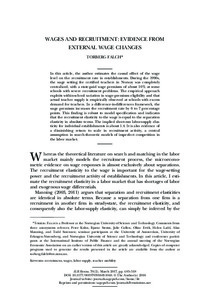Wages and recruitment: evidence from external wage changes

2017
70
2
March
483-518
labour mobility ; labour supply ; recruitment ; wages
Wages and wage payment systems
http://dx.doi.org/10.1177/0019793916651040
English
Bibliogr.
"In this article, the author estimates the causal effect of the wage level on the recruitment rate in establishments. During the 1990s, the wage setting for certified teachers in Norway was completely centralized, with a state-paid wage premium of about 10% at some schools with severe recruitment problems. The empirical approach exploits within-school variation in wage-premium eligibility and that actual teacher supply is empirically observed at schools with excess demand for teachers. In a difference-in-differences framework, the wage premium increases the recruitment rate by 6 to 7 percentage points. This finding is robust to model specification and indicates that the recruitment elasticity to the wage is equal to the separation elasticity in absolute terms. The implied short-run labor-supply elasticity for individual establishments is about 1.4. It is also evidence of a diminishing return to scale in recruitment activity, a central assumption in search-theoretic models of imperfect competition in the labor market."
Digital
The ETUI is co-funded by the European Union. Views and opinions expressed are however those of the author(s) only and do not necessarily reflect those of the European Union or the ETUI.